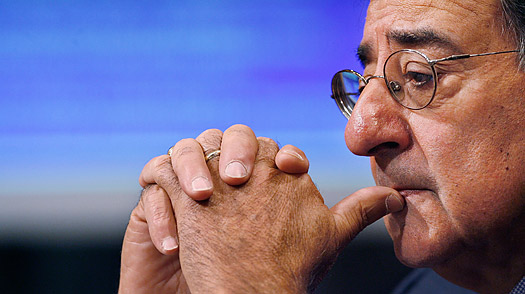
More than a few eyebrows went up when word broke that Leon Panetta would be President-Elect Barack Obama's pick to be the next director of the Central Intelligence Agency. Panetta has no significant intelligence experience and is known around the capital mainly for his budgetary prowess, bipartisanship and management skills. While these are all important traits for a spymaster, so is some experience with actual spycraft: backlash to Panetta started immediately, with Senate intelligence committee chair Dianne Feinstein noting that she believed "the agency is best-served by having an intelligence professional in charge at this time." The dilemma Obama faced — and perhaps the reason he chose someone from outside the spy community — is that he needs a C.I.A. director untainted by the Bush Administration's policies on torture and its handling of the Iraq War. Panetta is certainly untarred in that respect, but in order to have a chance to manage the country's intelligence-gathering apparatus, he'll have to get through a potentially difficult confirmation process to be headed by Feinstein.
Fast Facts:
• Born in Monterey, Calif. to Catholic, Italian immigrant parents who owned a restaurant and later a farm — Panetta worked for both businesses growing up. He received his bachelor's degree and law degree from Santa Clara University.
• Served in the Army from 1964 to 1966. Afterward, worked as a Republican legislative aide in the Senate and eventually became head of the U.S. Office for Civil Rights, where he was in charge of enforcing equal education laws under President Richard Nixon. After Panetta vigorously worked to desegregate Southern schools, to the chagrin of Nixon administration officials such as Vice President Spiro Agnew, he was forced to resign from the post.
• After his stint under Nixon, moved to New York City to take a job as executive assistant to New York Mayor John Lindsay, where he served as a liaison to the state and federal governments. After working for Lindsay for a year, Panetta switched to the Democratic Party and returned to California to practice law.
• Wrote a book in 1971 called Bring Us Together about his experiences as a civil rights official in the Nixon administration.
• Served eight terms in Congress, representing the Monterey area. While a Representative, Panetta worked on budgetary matters, environmental causes and civil rights issues. He was known for reaching across the aisle and for being a budget hawk.
• Repeatedly voted against President Ronald Reagan's military initiatives.
• Served as Bill Clinton's director of the Office of Management and Budget and was promoted to chief of staff in 1994. (Mack McLarty, the previous chief of staff and a Clinton childhood friend, was thought to be ineffective at keeping the President disciplined.) In his new role, Panetta brought more structure to the office of the President, curtailing long, meandering meetings Clinton tended to have and limiting access to the President so he could focus on key issues and not get distracted.
• Was a member of the Iraq Study Group along with Robert Gates before Gates became Defense Secretary — a post he will keep in the new Obama Administration.
• Has been director since 1997 of the Leon & Sylvia Panetta Institute for Public Policy, an leadership non-profit based at California State University in Monterey Bay, Calif. He has also taught public policy courses through the Institute and at Santa Clara University.
• Married, with three sons and five grandchildren.
Quotes By:
• "When I was at [the White House Office of Management and Budget], it was hard to find time to go to the bathroom. Now I can't eat. Maybe it's all working out."
— on his appointment to serve as Clinton's Chief of Staff, New Yorker, July 11, 1994
• "He's flexible and wants to get the job done. He always asked incisive questions, and knows what went wrong in Iraq."
— on Robert Gates, when he replaced Donald Rumsfeld as Secretary of Defense, San Jose Mercury News, Nov. 11, 2006
• "Those who support torture may believe that we can abuse captives in certain select circumstances and still be true to our values. But that is a false compromise. We either believe in the dignity of the individual, the rule of law, and the prohibition of cruel and unusual punishment, or we don't. There is no middle ground."
— in an essay about the use of torture, Washington Monthly, Jan/Feb/March 2008
• "Clearly he is a great speaker, thoughtful and with a lot of charisma...But it's time to put some meat on the bones."
— on Barack Obama's presidential campaign, Monterey County Herald, Aug. 21, 2008
Quotes About:
• "He's the perfect government servant."
— Then New York Rep. Charles Schumer, on Panetta's appointment to be Clinton's budget director, USA Today, Dec. 11, 1992
• "Leon knows when to be aggressive and conciliatory, how to pick off members, isolate them, close a deal. He knows where to settle, when, and all the intermediate judgments."
— Howard Paster, former White House legislative liaison, New Yorker, July 11, 1994
• "By the time he was here two weeks, I could see how calm things were...He increased the confidence level."
— Bill Clinton, on Panetta's debut as White House Chief of Staff, Washington Post, Jan. 04, 1997
• "He will bring a wealth of knowledge of the government to the C.I.A. post and an outside perspective that I think might be helpful at this juncture in the C.I.A.'s history."
— Lee Hamilton, former Congressman and co-chair of the Iraq Study Group, New York Times, Jan. 5, 2009